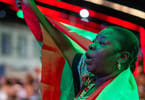KHARTOUM — From Cape Town to Khartoum, extreme tourists Guillaume and Enora have trekked off the beaten track on foot, surviving on less than two dollars (1.5 euros) a day on a journey that will take them three years to complete.
Unlike compatriots who have crossed the African continent by car in the Dakar rally, or by motorbike or bicycle raising money for a cause, these French tourists decided to trek through jungles and deserts in a professed bid to better understand humanity.
“In the beginning we walked for the adventure, and then we tried to understand Africans’ strange attitude towards us,” said Guillaume Combot, 31, a former French parachutist who studied psychology in Canada and had once tried to become a monk at the Saint-Benoit-du-Lac in Quebec.
“We took off without really knowing why. I was a little lost and I knew that I just wanted to walk.
“The first stage was to try and understand Africa, the second stage was more broad, to try and understand humanity,” Combot told AFP while in Khartoum.
He said people didn’t understand the motivation behind walking across the continent, particularly outside the cities and large towns.
“The question to us was always ‘why are you acting like you are poor, why are you pretending to be suffering?,'” he said, a little dispirited.
Together with his friend Enora Nedelec, 21, the pair left France for Cape Town in February 2009 with 3,000 Euros (nearly 4,000 dollars) in their pockets with the aim of walking back to Paris– an adventure that should take him three years, while she plans to end her journey in Jerusalem a little earlier.
Their budget gives them less than two dollars a day each to eat, drink, sleep and wash.
They venture off every day, not knowing when they’ll eat or where they’ll sleep.
“We wanted to colour every kilometre (mile) with emotion, which is something possible on foot but much more difficult when you are travelling faster,” said Nedelec, who put her midwifery studies on pause to discover the world on foot.
Travelling with backpacks, which at their heaviest were around eight kilogrammes (17 lbs), they often slept on mats in the open air.
“During our walk, we don’t know where we will sleep, how many kilometres (miles) until the next village, when we will eat, drink,” said Nedelec.
The two have been resting in Khartoum, marking the end of the sub-Saharan Africa leg of their journey and the beginning of their venture into the Arab world.
Without Nedelec, Combot walked through a large part of south Sudan — a region still recovering for a decades-old civil war with the north and where tribal conflicts and attacks by Ugandan rebels sow fear among many.
“There was one day I was stopped 14 times, but generally it was around 10 times a day … Every time I was asked ‘Why are you walking?'” Combot said.
Locals quizzed him on whether “tourists” worked for international organisations.
“They didn’t know what a tourist was,” said the young man with balding head, showing sculpted muscles beneath a beige shirt.
On some of the more obscure routes of south Sudan villagers, some of whom had never seen a white person, were intrigued by the Frenchman.
“In one village, they asked me to eat something to prove I was not a ghost,” he recalls.
On the banks of the Kiir river, at the entrance of the sensitive Abyei region which straddles north and south Sudan, policemen politely tied him to a tree, he said.
“They put a chain around my ankle and then the chief said: do you want coke or sprite?,” Combot said.
“I wish it could last 10 years. I’m not in a rush to go back. I don’t know what I’ll do once I’m home,” he added.
Their walking adventure can be followed on the Internet at: www.merakiste.fr/
WHAT TO TAKE AWAY FROM THIS ARTICLE:
- Unlike compatriots who have crossed the African continent by car in the Dakar rally, or by motorbike or bicycle raising money for a cause, these French tourists decided to trek through jungles and deserts in a professed bid to better understand humanity.
- On the banks of the Kiir river, at the entrance of the sensitive Abyei region which straddles north and south Sudan, policemen politely tied him to a tree, he said.
- I was a little lost and I knew that I just wanted to walk.






















